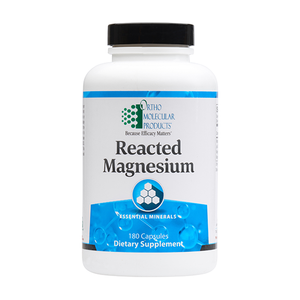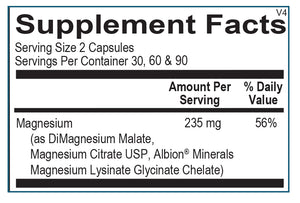

Reacted Magnesium, 180 caps
DESCRIPTION
Reacted Magnesium includes three forms of highly absorbed magnesium for a variety of protocols.
- Provides Three Forms of Highly Absorbed Magnesium for a Variety of Protocols
- High-Concentration Magnesium for Cardiovascular Support
- Helps Maintain Healthy Blood Pressure and Glucose Levels
- Promotes Energy Production and Muscle Relaxation
Reacted Magnesium provides three unique forms of highly-absorbed magnesium to ensure maximum absorption of this important macromineral. Most magnesium supplements use only a single source of magnesium, which can easily overwhelm a single pathway of absorption and limit uptake. Reacted Magnesium takes advantage of three unique pathways of absorption by providing magnesium as di-magnesium malate, magnesium citrate and magnesium glycinate for enhanced absorption, improved utilization and gastrointestinal (GI) comfort. Some individuals, who take other forms of magnesium supplements, often experience GI side effects, including gas, bloating, diarrhea, constipation or a combination of these symptoms. The forms of magnesium used in Reacted Magnesium preserve GI comfort while maximizing absorption and restoring magnesium levels in the body.
INGREDIENTS
Ingredients: Magnesium (as DiMagnesium Malate, Magnesium Citrate USP, TRAACS® Magnesium Lysinate Glycinate Chelate) 235
Does not contain: Gluten, corn, yeast, artificial colors and flavors.
DIRECTIONS
Serving Size:2 capsules
Servings Per Container: 60
Suggested Use: 2 or more capsules per day or as recommended by your health care professional
Cautions: If you are pregnant or nursing, consult your physician before taking this product
LEARN MORE
Magnesium is an abundant mineral in the body and is found naturally in many foods, like green leafy vegetables. It is also found in over-the-counter medications, such as laxatives. The average American intake of magnesium, according to the National Health and Nutrition Examination Survey (NHANES Study) is critically low: Many Americans fail to consume the estimated average requirement (EAR) established by the Institute of Medicine. In addition, more than 57% of the population does not meet the United States Department of Agriculture requirements for magnesium in the diet. Intracellular magnesium levels are decreased by excessive intake of alcohol, salt, coffee, phosphoric acid found in sodas, diets high in calcium and high stress levels. Because of widespread nature of magnesium deficiencies, adequate daily intake of magnesium is critical for proper hydration, stress response, muscle relaxation, promoting healthy blood pressure levels, optimal bone mineral density, and blood sugar regulation.
These statements have not been evaluated by the Food and Drug Administration. This product is not intended to diagnose, treat, cure, or prevent any disease.







